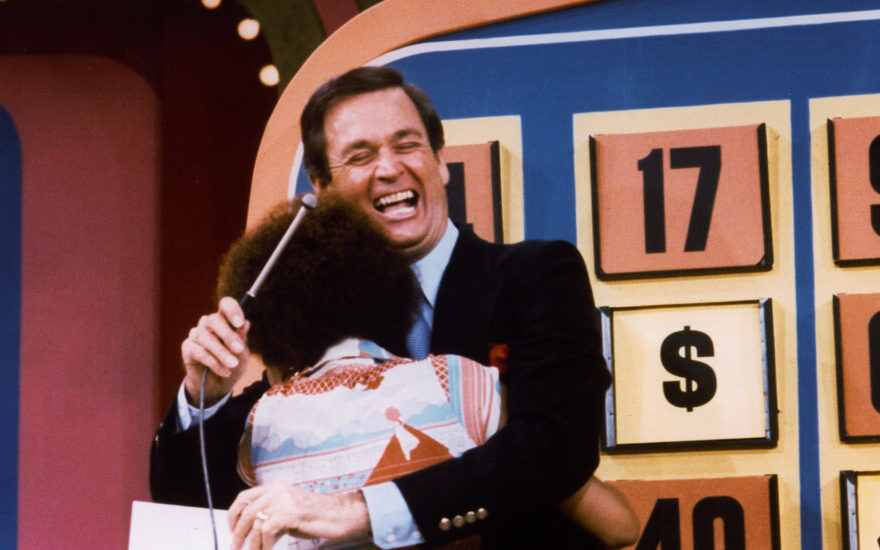At the helm of “The Price Is Right” for 35 years, Barker eased many sick days with his knack for turning silly games and giddy contestants into fun television.
By Alexis Soloski
On YouTube, fans have posted multiple compilations of contestants summoned to come on down to the podiums of “The Price Is Right.” They are screaming, they are hyperventilating, they are fully freaking out. All this before they have even bid on a luggage set, a roll-top desk, a home stereo system.
Bob Barker, the show’s longtime host, who died Saturday, was the still point in this delirious world. He joined the show in 1972 — an original version had run from 1956 to 1965 — and stayed on its Television City stage for 35 years. Eventually the stage was named for him. Over the decades, his ties narrowed, his collars shortened. His tan remained the finest that the sun or, just possibly, the aestheticians of Burbank, Calif., could provide, even as his hair went from brown to gray to white. His eyebrows were twin carets, inserting pleasure or gentle mockery into a scene. He had the gift, which great hosts have, of making inane, repetitive games feel risky, exciting. Each new contestant, tens of thousands of them during his tenure, seemed to delight him.
I watched “The Price Is Right” like a lot of us probably did: at home, sick, when nothing else was on and I couldn’t convince my mom to drive to a video store. I associate the show with the scents and flavors of those days — mentholated cough drops, chicken Cup O’ Noodles, children’s Robitussin. Woozy on phenylephrine, I followed games like Plinko, Bullseye, Cliff Hangers, in which bids sent a yodeling mountain climber up a cardboard slope. I could have sworn I’d hallucinated that last one. I had not.
Reliable, consistent, even courtly, Barker smiled through it all. And at the end of every episode, he reminded us to spay and neuter our pets. He wanted us to choose responsibly, to bid judiciously. He saw us through inflation, recession, bubble and boom and bust. He was America’s dad. Then its granddad. Had a sexual harassment suit by Dian Parkinson, one of “Barker’s Beauties,” gone forward, he might also have been seen as America’s lechy uncle. (The suit was eventually dropped, though other women received payments after suing the show for sexual harassment, racial discrimination and wrongful termination.)
There’s a frenzy, a late-capitalist absurdity to “The Price Is Right,” which continues under the gleeful ministrations of the comedian Drew Carey and requires little in the way of knowledge or skill, beyond a vague sense of what things cost at the supermarket. (An unusually dark aspect of the Carey era: a new game called Pay the Rent.) The show supports the very American notion that everyone deserves something for nothing — or at least, something for knowing the price of a box of raisins and having the upper body strength to spin a wheel. A show in which men made the rules and did the talking while women posed in short skirts, that feels an unfortunate kind of American, too.
Contestants lucky enough to come on down won prizes that some of them could not have afforded otherwise, prizes that they may not have wanted and. cars excepted, probably did not need. People populated that studio audience because they weren’t at work, because work couldn’t substitute for the excitement of being on television. Most jobs would not give them an RV just for nudging a number higher or lower. There are reasons that it is America’s longest running game show.
If we watched the show in the Barker years, if we watch it now, that likely means that we weren’t at work either. The hunger for wealth, for merchandise, can feel like a fever. So it makes sense that this is what we tuned into when we were sick, when we were low, when we had slipped, owing to illness or age or some other factor, out of the workday world.
Barker worked hard. No one could deny it. He seems to have been paid handsomely for his labor. (The models who caressed all that stereo equipment, not so much.) He was calm while the contestants had hysterics, smooth while they behaved erratically. If he wanted a new car, no yodeling would be required, no frenzy. He understood his position, his reputation, and could happily satirize it in side projects like his cameos in “Happy Gilmore,” “The Nanny,” and “How I Met Your Mother.”
So raise a glass — or a plastic cup of cough syrup — to a man who knew his own worth.
Alexis Soloski has written for The Times since 2006. As a culture reporter, she covers television, theater, movies, podcasts and new media. More about Alexis Soloski
Site Index
Site Information Navigation
Source: Read Full Article


